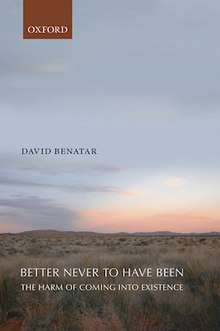Better Never to Have Been
Better Never to Have Been: The Harm of Coming into Existence is a 2006 book by South African philosopher David Benatar. In the book, Benatar makes a philosophical case for antinatalism, claiming that humans are wronged by their parents when they bring them into existence. The two main arguments used to support this claim are: the concept that there exists an asymmetry between pain and pleasure and the idea that humans have an unreliable assessment of life's quality. The book was preceded by Benatar's 1997 paper "Why It Is Better Never to Come into Existence".[1]
 | |
| Author | David Benatar |
|---|---|
| Language | English |
| Publisher | Oxford University Press |
Publication date | 2006 |
| ISBN | 978-0-199-29642-2 |
| OCLC | 427507306 |
Critical reception
In his review, the philosopher Yujin Nagasawa, questioned why Benatar framed the book as a positive thesis, rather than as a counter-intuitive philosophical puzzle. As a result, Nagasawa felt that he could not recommend the book to everyone.[2]
Bioethicist David DeGrazia published a rebuttal to Benatar's arguments in 2010; despite the disagreement with Benatar's position, DeGrazia commended the book, stating: "I conclude with praise for his work and the intellectual virtues it embodies."[3]
Response to criticism
In 2013, Benatar responded to critics of the book, in the paper "Still Better Never to Have Been: A Reply to (More of) My Critics".[4]
In popular culture
The creator of True Detective, Nic Pizzolatto, has cited Better Never to Have Been as an influence on the creation of the character Rust Cohle.[5]
References
- Belshaw, Christopher (2007-06-09). "Review of Better Never to Have Been: The Harm of Coming into Existence". Notre Dame Philosophical Reviews. ISSN 1538-1617.
- Nagasawa, Yujin (2008-07-01). "Review: David Benatar: Better Never to Have Been: The Harm of Coming into Existence". Mind. 117 (467): 674–677. doi:10.1093/mind/fzn089. ISSN 0026-4423.
- DeGrazia, David (2010-08-01). "Is it wrong to impose the harms of human life? A reply to Benatar". Theoretical Medicine and Bioethics. 31 (4): 317–331. doi:10.1007/s11017-010-9152-y. ISSN 1573-1200. PMID 20625933.
- Benatar, David (2013-06-01). "Still Better Never to Have Been: A Reply to (More of) My Critics". The Journal of Ethics. 17 (1): 121–151. doi:10.1007/s10892-012-9133-7. ISSN 1572-8609.
- Calia, Michael (2014-02-02). "Writer Nic Pizzolatto on Thomas Ligotti and the Weird Secrets of 'True Detective'". WSJ. Retrieved 2020-05-31.